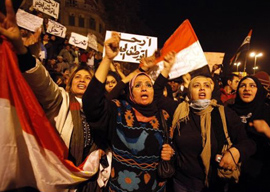
March 07, 2011

In France, scene of Europe’s first modern revolution with its promise of universal rights, women were not granted the vote until 1944. Twelve years later, Egypt elected its first female member of parliament. That forward stride was negated by two facts: the legislature had no power and, nearly fifty years later, there were only four female representatives in the entire Egyptian legislature. Egyptians are now demanding not only that women enter parliament in greater numbers, but that the legislature have real power to check the executive and the military. Women are a vital part of the dynamic leading to a society in which all are equal before the law.
That there is a long way to go became clear on the night that Hosni Mubarak resigned and mobs crowded into Tahrir Square to claim credit for a revolution that others had made. (They were like those “resisters of the eleventh hour” who jammed the streets of Paris on the night of August 24, 1944 to pretend they had been in the Resistance all along.) I spoke by telephone to a young woman who had been in the square most of the previous two weeks, and she said that many of those who came on February 11 had not been there before. Some men attacked and sexually assaulted CBS correspondent Lara Logan. About eighty-three percent of all Egyptian women said they had been harassed in public at least once, while half of them said they suffered similar treatment every day. This is according to the Egyptian Center for Women’s Rights” 2008 report. The dictatorship ignored that behavior, but a democracy cannot afford to do so.
Taking responsibility for one’s own life, which is what democracy requires, means growing up. You are no longer the leader’s wayward child, you are a full citizen with obligations to other citizens. If this revolution is to succeed beyond merely sending tyrants to luxurious retirement, the people will have to become sovereign. The women must have an equal say with men in how the society is constituted. And the men must, if they are to be men, grow up.
Gideon Levy wrote of his country’s treatment of the Arabs it rules:
What sort of democracy is this, if exactly half the state’s residents don’t benefit from it? Indeed, can the term “democratic” be applied to a state in which many of the residents live under a military regime or are deprived of civil rights? Can there be democracy without equality, with a lengthy occupation and with foreign workers who have no rights?
He might have been writing of women in the Arab world, which may enshrine the equality of women before Israel does the same with its Arab population.